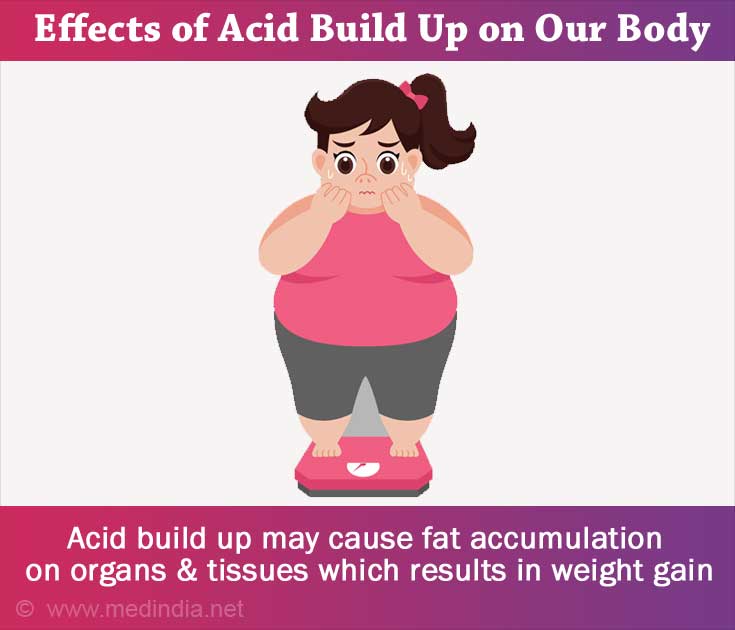Effects of Acid Build Up in Our Body
The difference between a 20 year old and a 40 year old physically is that there are more of accumulated acidic wastes at 40 than at 20.
When we are born we have the highest alkaline mineral concentration and also the highest body pH. One accumulates more acidic wastes with age.
There is not much blood flow around fat. Any organ or tissue near the acid accumulation gets a smaller supply of blood and can get damaged in the long run. It’s said that the acidic food and drinks lower ones blood oxygen level

Following are the effects of acid build up in the body:
- Connective tissue gets weakened and facial skin and hair lose their tone. It is the accumulated acid that damages the cartilages and irritates the joints. Gout is the accumulation of uric acid in the joints.
- Excess acid wastes produced by the body stresses the kidney as it has to work harder for eliminating them from the blood. Thus, kidney functioning could be impaired in the long run
- There is tendency to accumulate fat and thereby gain weight.
- When the body’s condition is too acidic, it frequently makes compensating withdrawals of calcium from the bones leaving them brittle and subject to fractures.
- Increase in the body fat occurs overtime.
- Sleep patterns get disturbed.
- Friendly bacteria in the intestine die and the immune system gets impaired.
- Vitamins and Minerals from food and supplements are not well absorbed.
- Free radical oxidation occurs with greater ease, while antioxidant activity is impaired.
- Digestion is impaired and flatulence, bloating and discomfort are more frequent.
In an article in European Journal of Nutrition on 'Diet, evolution and aging--the path physiologic effects of the post-agricultural inversion of the potassium-to-sodium and base-to-chloride ratios in the human diet' Frassetto L and others argue that any level of acidosis may be unacceptable from an evolutionarily perspective, and indeed, that a low-grade metabolic alkalosis may be the optimal acid-base state for humans. Our ancestors mostly ate fruits and vegetables whereas after industrialization - only 200 years ago our diet changed and many health problems resulted from this mismatch between our genetically determined nutritional requirements and our current diet. The current diet has deficiency of potassium alkali salts (K-base), that are amply present in the plant foods that our ancestors ate in abundance, and the exchange of those salts for sodium chloride (NaCl), which has been incorporated copiously into the contemporary modern diet. Their research has shown that contemporary net acid-producing diets do indeed characteristically produce a low-grade systemic metabolic acidosis in otherwise healthy adult subjects, and that the degree of acidosis increases with age, in relation to the normally occurring age-related decline in kidney functional capacity. They also found that neutralization of the diet net acid load with dietary supplements of potassium bicarbonate (KHCO3) improved calcium and phosphorus balances, reduced bone resorption rates, improved nitrogen balance, and mitigated the normally occurring age-related decline in growth hormone secretion--all without restricting dietary salt or NaCl. Other researchers showed that hip fracture incidence in older women correlated with animal protein intake, and they suggested a causal relation to the acid load from protein. Plant food intake tended to be protective against hip fracture, and that hip fracture incidence among countries correlated inversely with the ratio of plant-to-animal food intake. These findings were confirmed in a more homogeneous population of white elderly women residents of the U.S.
 MEDINDIA
MEDINDIA

 Email
Email













Great Work !!! Good Content!